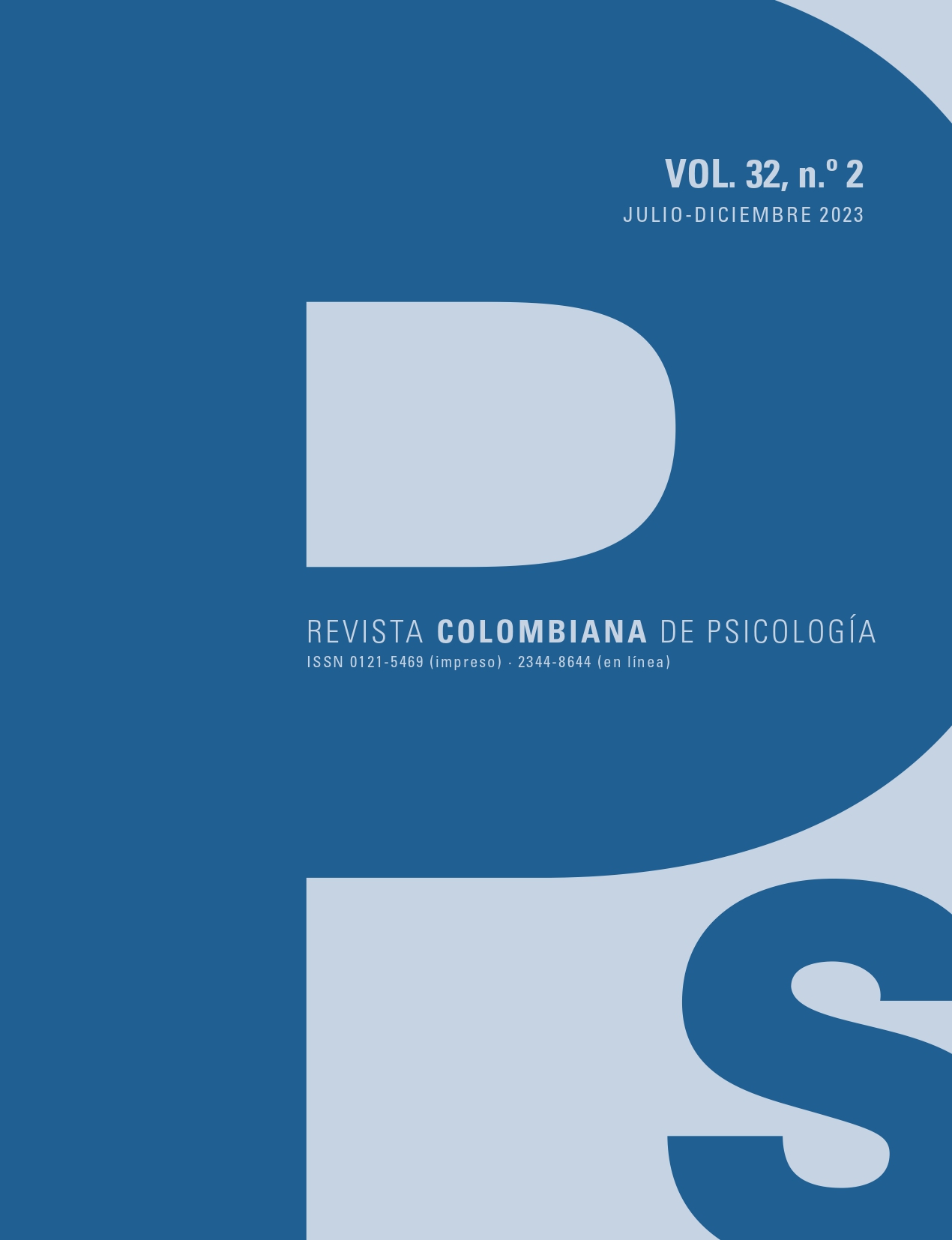Model of Psychological Empowerment Based on Structural Equations for Predicting Autonomy
Modelo de empoderamiento psicológico basado en ecuaciones estructurales para predecir la autonomía
DOI:
https://doi.org/10.15446/rcp.v30n2.82149Keywords:
Psychological empowerment, autonomy, assertiveness, locus of control, self-esteem, structural equations model (en)Empoderamiento psicológico, autonomía, asertividad, locus de control, autoestima, modelo de ecuaciones estructurales. (es)
Downloads
The study relies on the assumption that one of the main effects of phycological empowerment composed by attributes like self-esteem, locus of control, and assertiveness, is increased autonomy. The theoretical arguments are tested based on a structural equation model that allows estimating hypothetical relationships simultaneously. Additionally, differences in means between women and men are estimated for each phycological variable and the hypothetical model is tested separately to both sexes. 1,569 people (56% women) from five Mexican States compose the sample. The average age is 29 years and 59% of the sample has college degrees. The results suggest that psychological empowerment is strongly related to autonomy.
How to cite this article: Muñoz-Márquez, C. E., Morales Barrera, R., & Domínguez Espinosa, A. del C. (2021). Model of Psychological Empowerment Based on Structural Equations for Predicting Autonomy. Revista Colombiana de Psicología, 30(2), 55-69. Retrieved from https://revistas.unal.edu.co/index.php/psicologia/article/view/82149
Este trabajo parte del supuesto de que uno de los principales efectos del empoderamiento psicológico es el incremento de la autonomía, y que atributos como la autoestima, el locus de control y la asertividad lo constituyen. Con base en ello,
se probaron ambos planteamientos teóricos a través de un modelo de ecuaciones estructurales, ya que la técnica permite estimar relaciones hipotéticas simultáneamente. Asimismo, se estimaron las diferencias en las medias de cada una de
las variables psicológicas entre mujeres y hombres y se probó el mismo modelo hipotético de forma separada para cada sexo. La muestra la conforman 1,569 personas (56% son mujeres) de cinco entidades federativas de México, la edad promedio es de 29 años y el 59% cuentan con estudios universitarios. Los resultados sugieren que el empoderamiento psicológico tiene una fuerte relación con la autonomía.
Los valores de los índices mostraron evidencia de ajuste satisfactorio (X2(19, N=1,569)= 249.80, p< .001; GFI=.90; CFI=.94; SRMR=.04; RMSEA=.08). Estos resultados son consistentes con la teoría presentada, lo que sugiere que las personas con mayor autoestima, locus de control y asertividad tienen mayores probabilidades de empoderarse y, como resultado, tienen una mayor probabilidad de ser más autónomas.
Cómo citar este artículo: Muñoz-Márquez, C. E., Morales Barrera, R., & Domínguez Espinosa, A. del C. (2021). Modelo de empoderamiento psicológico basado en ecuaciones estructurales para predecir la autonomía. Revista Colombiana de Psicología, 30(2). Retrieved from https://revistas.unal.edu.co/index.php/psicologia/article/view/82149
References
Banda A. L., & Morales, M. A. (2015). Empoderamiento psicológico: un modelo sistémico con componentes individuales y comunitarios. [Psychological Empowerment: A systemic model with individual and community components]. Revista de Psicología (pucp), 33(1), 3-20. http://www.scielo.org.pe/scielo.php?script=sci_arttext&pid=S0254-92472015000100001&lng=es&tlng=en
Batliwala, S. (1997). El significado del empoderamiento de las mujeres: nuevos conceptos desde la acción. In M. León (Ed.) Poder y empoderamiento de las mujeres, (pp. 187-211). Santa Fé de Bogotá. Colombia. Retrieved from https://www.congresoed.org/wpcontent/uploads/2014/10/D4_Batliwala_1997.pdf
Bekker, M. H. (1993). The Development of an Autonomy Scale Based on Recent Insights Into Gender Identity. European Journal of Personality, 7, 177-194. https://doi.org/10.1002/per.2410070304
Bekker, M. H., & van Assen, M. A. (2006). A Short Form of the Autonomy Scale: Properties of the Autonomy–connectedness Scale (acs–30). Journal of Personality Assessment, 86, 51-60. https://doi.org/10.1207/s15327752jpa8601_07
Casique, I. (2001). What Difference Does it Make? Women’s Autonomy and Power and Use of Contraception in Mexico. Paper presented at the XXIV iussp General Population Conference, Salvador, Bahia. August. Retrieved from https://www.researchgate.net/profile/Irene_Casique/publication/238707419_What_difference_does_it_make_Women’s_autonomy_and_power_and_use_of_contraception_in_Mexico/links/02e7e538df3d326efe000000.pdf
Cattaneo, L. B., & Chapman, A. R. (2010). The Process of Empowerment: A Model for Use in Research and Practice. American Psychologist, 65, 646-659. https://doi.org/10.1037/a0018854
Chaturvedi, S., Singh, G., & Rai, P. (2016). Progress Towards Millennium Development Goals with Women Empowerment. Indian Journal of Community Health, 28, 10-13. https://www.iapsmupuk.org/journal/index.php/IJCH/article/view/640
Covarrubias, F. A. (2018). Poder, normas sociales y desigualdad de las mujeres en el hogar. Nóesis: Revista de Ciencias Sociales y Humanidades, 27, 140-158. Epub 03-Jul-2020. https://doi.org/10.20983/noesis.2018.1.7
Flores, M. M., & Cortés, A. L. (2014). Asertividad: Sus lazos con el autoconcepto y el locus de control en jóvenes. In Aportaciones de la Etnopsicología Mexicana al Estudio de la Cultura y la Personalidad (pp. 107-128). México: Universidad Autónoma de Yucatán.
Flores, M. M., & Díaz-Loving, R. (2002). Asertividad: una alternativa para el óptimo manejo de las relaciones interpersonales. México: uady-Porrúa.
Flores, M. M., & Díaz-Loving, R. (2004). Escala Multidimensional de Asertividad (ema). México: Manual Moderno.
Foucault, M. (2002). La Arqueología del Saber. Siglo XXI Editores Argentina.
Freire, P. (2005). Pedagogía del Oprimido. Siglo XXI.
García, B. (2003). Empoderamiento y autonomía de las mujeres en la investigación sociodemográfica actual. Estudios Demográficos y Urbanos, 18, 221-253. https://www.jstor.org/stable/40315151
González, P. J. A., Nuñez, P. J. C., Glez.-Pumariega, S., & García, G. M. S. (1997). Autoconcepto, autoestima y aprendizaje escolar. Psicothema, 9, 271-289. https://www.redalyc.org/pdf/727/72709204.pdf
Gozálvez-Pérez, V., & Contreras-Pulido, P. (2014). Empowering Media Citizenship Through Educommunication. Comunicar, 42, 129-136. https://doi.org/10.3916/C42-2014-12
Haushofer, J., & Fehr, E. (2014). On the Psychology of Poverty. Science, 344, 862-867. https://doi.org/10.1126/science.1232491
Hollander, E. P., & Offermann, L. R. (1990). Power and Leadership in Organizations: Relationships in Transition. American Psychologist, 45, 179-189. https://doi.org/10.1037/0003-066X.45.2.179
Jejeebhoy, S. J., & Sathar, Z. A. (2001). Women’s Autonomy in India and Pakistan: The Influence of Religion and Region. Population and Development Review, 27, 687-712. https://doi.org/10.1111/j.1728-4457.2001.00687.x
Kabeer, N. (2005). Gender Equality and Women’s Empowerment: A Critical Analysis of the Third Millennium Development Goal 1. Gender & Development, 13, 13-24. http://doi.org/10.1080/13552070512331332273
Kerlinger, F. N., Lee, H. B., Pineda, L. E., & Mora Magaña, I. (2002). Investigación del comportamiento. McGraw Hill.
León, M. (1997). Empoderamiento: relaciones de las mujeres con el poder. Revista Foro, 33, 37-49. https://search.proquest.com/openview/ce344c3996276e13a062256ed7420f8f/1.pdf?pq-origsite=gscholar&cbl=15434
Lincoln, N. D., Travers, C., Ackers, P., & Wilkinson, A. (2002). The Meaning of Empowerment: The Interdisciplinary Etymology of a New Management Concept. International Journal of Management Reviews, 4, 271-290. https://doi.org/10.1111/1468-2370.00087
Martín-Albo, J., Núñez, J. L., Navarro, J. G., & Grijalvo, F. (2007). The Rosenberg Self-Esteem Scale: Translation and Validation in University Students. The Spanish Journal of Psychology, 10, 458-467. http://doi.org/10.1017/S1138741600006727
Martín-Baró, I. (2006). Hacia una psicología de la liberación. Psicología Sin Fronteras: Revista Electrónica de Intervención Psicosocial y Psicología Comunitaria, 1(2), 1. https://dialnet.unirioja.es/servlet/articulo?codigo=2652421
McWhirter, E. H. (1991). Empowerment in Counseling. Journal of Counseling & Development, 69, 222-227. https://doi.org/10.1002/j.1556-6676.1991.tb01491.x
Mechanic, D. (1991). Adolescents at Risk: New Directions. Journal of Adolescent Health, 12, 638-643. https://doi.org/10.1016/1054-139X(91)90012-M
Moradi, B., & Risco, C. (2006). Perceived Discrimination Experiences and Mental Health of Latina/o American Persons. Journal of Counseling Psychology, 53, 411-421. https://doi.org/10.1037/0022-0167.53.4.411
Mosedale, S. (2005). Assessing Women’s Empowerment: Towards a Conceptual Framework. Journal of International Development, 17, 243-257. https://doi.org/10.1002/jid.1212
Osés, R. M., Duarte, E., & Pinto L. M. L. (2016). Juegos cooperativos: efectos en el comportamiento asertivo en niños de 6o. grado de escuelas públicas. Revista Electrónica de Investigación Educativa, 18, 176-186. http://redie.uabc.mx/redie/article/view/886
Oxaal, Z., & Baden, S. (1997). Gender and Empowerment: Definitions, Approaches and implications for Policy (Report 40). Institute of Development Studies at the University of Sussex Sussex. Retrieved from https://www.bridge.ids.ac.uk/reports/re40c.pdf
Pinderhughes, E. B. (1983). Empowerment for Our Clients and for Ourselves. Social Casework, 64, 331-338. https://doi.org/10.1177/104438948306400602
Rappaport, J. (1987). Terms of Empowerment/Exemplars of Prevention: Toward a Theory for Community Psychology. American Journal of Community Psychology, 15, 121-148. https://doi.org/10.1007/BF00919275
Riger, S. (1997). ¿Qué está mal con el empoderamiento? In León Magdalena (Ed.) Poder y empoderamiento de las mujeres, (pp.55-74), Santa Fé de Bogotá. Colombia. Retrieved from https://bibliotecaiztapalapauin.files.wordpress.com/2018/07/podermujer2.pdf
Rosenberg, M. (1965). Society and the Adolescent Self-image. Princeton, NJ: Princeton University Press. Retrieved from https://www.jstor.org/stable/j.ctt183pjjh
Ross, C. E., & Mirowsky, J. (1989). Explaining the Social Patterns of Depression: Control and Problem Solving: Or Support and Talking? Journal of Health and Social Behavior, 30, 206-219. https://doi.org/10.2307/2137014
Rotter, J. B. (1966). Generalized Expectancies for Internal Versus External Control of Reinforcement. Psychological Monographs: General and Applied, 80(1), 1-28. https://doi.org/10.1037/h0092976
Rowlands, J. (1997a). Empoderamiento y mujeres rurales en Honduras: un modelo para el desarrollo. In León Magdalena (Ed.) Poder y empoderamiento de las mujeres, (pp. 213-245), Santa Fé de Bogotá. Colombia. Retrieved from: https://bibliotecaiztapalapauin.files.wordpress.com/2018/07/podermujer2.pdf
Rowlands, J. (1997b). Questioning Empowerment: Working with Women in Honduras. Oxfam. Retrieved from: https://policy-practice.oxfam.org/resources/questioning-empowerment-working-with-women-in-honduras-121185/
Sen, G., & Grown, C. (1987). Development, Crises and Alternative Visions: Third World Women’s Perspectives (1st ed.). Routledge. Retrieved from https://doi.org/10.4324/9781315070179
Shavelson, R. J., Hubner, J. J., & Stanton, G. C. (1976). Self-concept: Validation of Construct Interpretations. Review of Educational Research, 46, 407-441. https://doi.org/10.3102/00346543046003407
Solomon, B. B. (1987). Empowerment: Social Work in Oppressed Communities. Journal of Social Work Practice, 2, 79-91. https://doi.org/10.1080/02650538708414984
Spreitzer, G. M. (1995). Psychological Empowerment in the Workplace: Dimensions, Measurement, and Validation. Academy of Management Journal, 38, 1442-1465. https://doi.org/10.2307/256865
Stromquist, N. (1995). The Theoretical and Practical Bases for Empowerment. In Carolyn Medel-Anonuevo (Ed.), Women, Education, and Empowerment: Pathways Towards Autonomy (pp. 13-22). https://unesdoc.unesco.org/ark:/48223/pf0000100662
Stromquist, N. (1997). La búsqueda del empoderamiento: en qué puede contribuir el campo de la educación. In León Magdalena (Ed.) Poder y empoderamiento de las mujeres (pp. 75-95). Santa Fé de Bogotá. Retrieved from https://bibliotecaiztapalapauin.files.wordpress.com/2018/07/podermujer2.pdf
Upadhyay, U. D., Gipson, J. D., Withers, M., Lewis, S., Ciaraldi, E. J., Fraser, A., ... & Prata, N. (2014). Women’s Empowerment and Fertility: A Review of the Literature. Social Science & Medicine, 115, 111-120. https://doi.org/10.1016/j.socscimed.2014.06.014
Visdómine-Lozano, J. C., & Luciano, C. (2006). Locus de control y autorregulación conductual: revisiones conceptual y experimental. International Journal of Clinical and Health Psychology, 6, 729-751. https://www.redalyc.org/pdf/337/33760313.pdf
Zimmerman, M. A. (1995). Psychological Empowerment: Issues and Illustrations. American Journal of Community Psychology, 23, 581-599. https://doi.org/10.1007/BF02506983
Zimmerman, M. A. (2000). Empowerment theory. In Rappaport J., & Seidman E. (Eds.), Handbook of Community Psychology (pp. 43-63). Springer Science + Business Media New York. Retrieved from https://doi.org/10.1007/978-1-4615-4193-6
How to Cite
APA
ACM
ACS
ABNT
Chicago
Harvard
IEEE
MLA
Turabian
Vancouver
Download Citation
CrossRef Cited-by
1. Suelen Emilia Castiblanco Moreno, Javier Armando Pineda Duque. (2021). Empoderamiento femenino y asociaciones productivas comunitarias: Una revisión sistemática de literatura. Acta Colombiana de Psicología, 25(1), p.9. https://doi.org/10.14718/ACP.2022.25.1.2.
2. Mohammad Ali Ashraf, Tanzila Amir, Sarker Rafij Ahmed Ratan. (2025). Effects of faculty psychological empowerment and autonomy on sustainable quality education in the didactics of accreditation and green pedagogy. Journal of Global Responsibility, https://doi.org/10.1108/JGR-10-2023-0170.
3. Jessy Bergamin, Monja Hoven, Ruth J. van Holst, Claudi L. Bockting, Damiaan Denys, Barbara Nevicka, Judy Luigjes. (2024). Development and validation of the Autonomy Scale Amsterdam. Comprehensive Psychiatry, 131, p.152466. https://doi.org/10.1016/j.comppsych.2024.152466.
4. Andry Bustamante-Barreto, Javier Corredor, Juan David Hernandez-Posada. (2024). The association between owning a videogame console and the gender gap in STEM: an instrumental variable approach. Journal of Computers in Education, 11(1), p.51. https://doi.org/10.1007/s40692-022-00247-7.
5. Gillian King, Shauna Kingsnorth, Amy C. McPherson, Diana Tajik-Parvinchi. (2024). Autonomy, self-realization, and psychological empowerment: a prospective mixed methods study of the effects of residential immersive life skills programs for youth with physical disabilities. Disability and Rehabilitation, 46(14), p.3097. https://doi.org/10.1080/09638288.2023.2243222.
Dimensions
PlumX
Article abstract page views
Downloads
License
Copyright (c) 2021 Revista Colombiana de PsicologíaThe RCP is published under the Creative Commons license and can be copied and reproduced according to the conditions of this license (http://creativecommons.org/licenses/by-nc-nd/2.5). RCP articles are available online at https://revistas.unal.edu.co/index.php/psicologia/issue/archive. If you would like to subscribe to the RCP as reader, please go to https://revistas.unal.edu.co/index.php/psicologia/information/readers and follow the instructions mentioned in the webpage. Additionally, a limited number of print journals are available upon request. To request print copies, please email revpsico_fchbog@unal.edu.co.


























